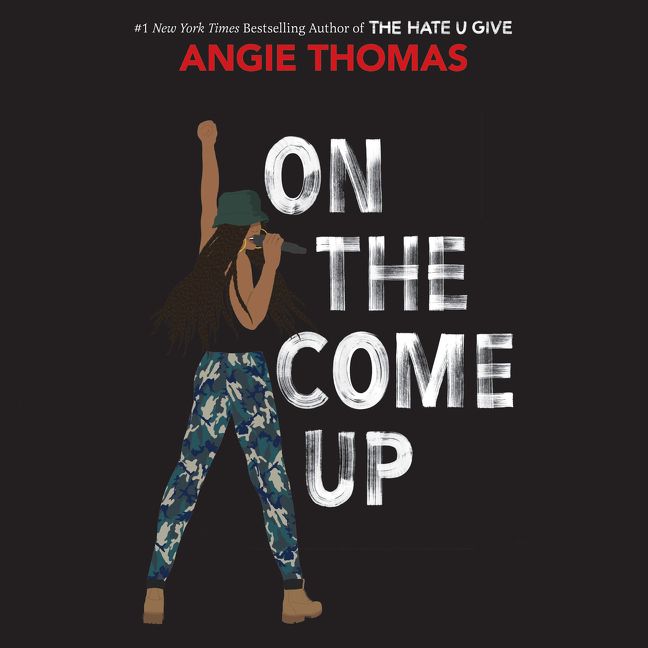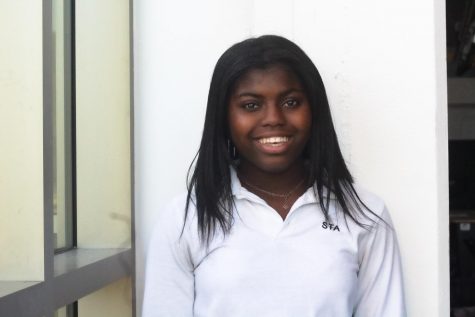On the Come Up: a look into young hip hop
Angela Thomas takes readers into the mind of a rising rap star, complete with all the trappings of incumbent success.
March 1, 2019
On Kendrick Lamar’s song “DNA”, you can hear an excerpt from a FOX news clip with an anchor lamenting the nature of hip hop music. They decry it is angry and glorifying drugs and violence. The anchor states “hip hop has done more damage to young African Americans than racism in recent years”. However, it is not often a glorification, but a simple observation of the world around them, a community, defined by outsiders as wrought with drugs and violence. “On the Come Up,” written by “The Hate U Give” author Angela Thomas, is a look into that very world, through the eyes of a girl our age.
If the Hate U Give acted as a vignette into the lives of students of color at STA, “On the Come Up” takes us across the Troost divide. The setting was one similar to that of Kansas City’s inner city, complete with the stigma and fear that comes from those not a part of it. Bri lives in Garden Heights, the same neighborhood in which “The Hate U Give” protagonist Starr resided. She is the daughter of late underground rap legend “Lawless,” who was murdered due to his affiliation with a rival gang. Bri’s dream is to use her own passion for rap to raise her family out of poverty.
Often, black kids who want to be rappers are seen as unintelligent, and following a pipe-dream. Bri is well-researched, informed and an accomplished lyricist. She thinks in bars and has immersed herself in the flows and beats of great rappers past. She attends a performing arts school in Midtown, a nicer area, in hopes of receiving a better education. Driven by her passion for rap as a craft, she majors in creative writing.
Bri, along with some other Garden Heights high schoolers, is bussed in to bolster the school’s promise of diversity, which gave it access to better grants. That necessity did not stop faculty from disproportionately punishing the students of color.
In every state in America, black girls are twice as likely to be suspended, according to US News. Black girls around the country are watched under a microscope and face punitive measures disproportionately compared to their white peers. When Bri rolled her eyes and smacked her teeth, she was written up as aggressive, while her white peers were ignored for doing the same things in less “urban” ways. As a result of this stigmatization, Bri is targeted by school security guards who assume she is a drug dealer because she sold candy and snacks to her peers.
Seeking a creative outlet for her frustration, Bri records a song titled “On the Come Up”, in which she claps back at the guards who threw her on the ground and society at large for instantly assuming the worst of her. The song was meant to take the stereotypes thrown at her and deliberately respond by playing into them. However, the (predominantly white) news media took the lyrics at face value, and lamented the negative impacts on “the children”. Bri notes, as so many young black people do, that she is not included in those children whose safety society is concerned about.
Bri is a junior in high school dealing with boy drama, and ACT prep, much like many of us. Bri is also trying to keep the lights and heat on at home while being attacked by adults and institutions at every turn just for using a platform to emote. Female rappers face denigration on all sides, from their male peers, to “hip hop heads”, the hyper-pretentious fanbase that invalidates every artist after the 90s save three Kanye albums. They face a news cycle which seems intent on portraying black artists as dangerous whenever their message is not palatable to white suburban listeners. That same audience turns its back on those artists at any sign of deliberate politics that may disrupt the image they make in their head of a belligerent caricature with no substance to them. Bri has to risk her emotional well-being, and her relationship with the people she loves, to follow her dream.
Overall, I give this book 4.5 out of 5 stars. Angela Thomas’s second novel, like the first, gifts us with a voice and tone very rarely seen, let alone one acknowledged by mainstream literary communities. At times, this book lacks the focus and character arc previously seen by Starr in “The Hate U Give”. While the central theme is rap, Bri loses herself in that world, and the moral lines get so muddled that at times Bri, thus the narrative, lost direction. Driven by a need to support her family, and frustrated by those around her, Bri lashes out and makes poor choices that make it hard for the reader to support her.
Much like black people, black characters in media are often made to be villains or angels, always one-dimensional. Although she may have lost her way, at least Bri was a human being. A sense of finality or growth in Bri’s character would have tied loose ends. However, the argument could be made that like many our age, Bri is still on a journey of self-discovery. All of us have our own version of a “come up”, be it the arts, or a medical degree, or entrepreneurship. The resonating message throughout “On the Come Up” is the importance of staying true to yourself as you work to achieve those goals.











R Gina Renee • Mar 3, 2019 at 6:00 pm
Dear Faith,
My favorite parts of this review include the way you connect the new novel to research about the overly punitive approach to the discipline of black girls and your observations about a fuzzy narrative arc and drifting characterization. Thanks again for your clear voice!
Ms. Renee